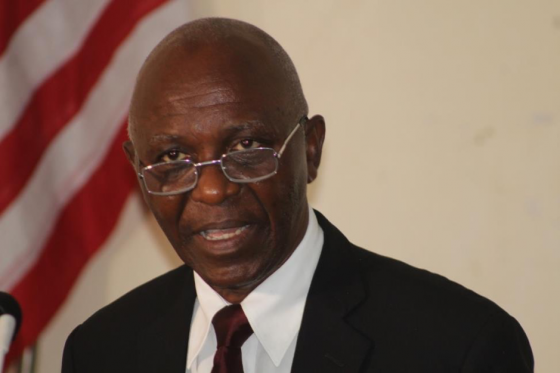Minister Sonii to Push for NCHE Financial, Other Improvements

Minister Sonii: "I am confident that things will improve at the Commission."
-Commits himself to meet and dialogue with Finance Minister Tweh to increase NCHE’s budget
Education Minister Professor Ansu Dao Sonii has committed himself to reaching out to the Executive Branch of Government through the Finance Ministry to push for improvement in the budgetary allotment to the National Commission on Higher Education (NCHE).
Minister Sonii speaking to the Daily Observer yesterday through a telephone interview, said, “I don’t want to be exact in saying what is ahead, but I am confident that things will improve for the smooth functioning of the Commission. President Weah wants to see improvement at all levels of the education system and as such, he will welcome the idea of ensuring that the Commission on Higher Education has all it takes to do its work,” he said confidently.
According to him, there are more tertiary and professional learning institutions nowadays as compared to ten or twenty years back, and as such it takes empowerment for the NCHE to perform its task effectively in dealing with those challenges accompanying the proliferation of learning institutions.
“With the reality of the day, we can’t expect miracles from NCHE if they don’t have adequate support. The President has a listening ear and a willing mind to provide solutions to wherever the need arises.
“This is why I will begin a meaningful dialogue with my colleague, Finance and Development Planning Minister, Samuel Tweah very soon. I know he will give me the needed attention and something good will happen in the best interest of the education sector, mainly, the higher levels, too,” Sonii said.
The Education Minister’s assurance came following an interview with NCHE Director Dr. James Lablah earlier when he decried the lack of adequate financial support to do the work of the Commission on Higher Education.
Dr. Lablah is the acting head of Secretariat at the NCHE while Professor Sonii is the chairman of the board of the Commission.
“In the 2018/2019 fiscal period, we received US$313,814. At that time we had thirty staffers, including professional technicians and academicians. The team at the time had forty six universities and colleges to contend with.
“But in 2019/2020, the budget dwindled to US$285,812, with the same number of staff doing the job,” he said on a local radio.
He further explained that instead of the Commission’s budget increasing, it continues to reduce, even though there is more work now than ever before.
“Currently we have fifty three (53) institutions of higher learning. I mean some are offering Bachelor’s and Master’s degrees while others are offering Associate of Arts degrees (AA), but our staff has dropped to twenty six while the budget dropped to US$172,455. This is the reality we are living with and it is making it difficult for the Commission to do full monitoring or perform other activities,” Dr. Lablah noted.
The NCHE was established in 1989 by Legislation and its scope of operations covers regulation, monitoring, supervision, and evaluation of all post-secondary institutions of learning across the country.
The Commission is also responsible as per its scope to design policies and give priority programs for the operations of higher education institutions in Liberia.
“In 1989, we only had the University of Liberia, Cuttington University and Tubman University. Today, the case is different. We have more institutions of higher learning to deal with but we lack logistics and enough staffers to do the job,” Lablah said.
He added: “Despite all of these challenges, there is a team with a spirit of commitment, passion, patriotism, professionalism and purpose helping to keep the office running. But to note for the record, we don’t go for any budget defense. That allotment is made to our office separately. It is not part of MOE’s budget.”
He said he does not know all of the details but the Commission has never been invited to speak on or about the budget it runs to serve well.
“We are aware that our national budget is little and many institutions and agencies are in need of more to perfect their workings, but on the overall, it is the universities and colleges who qualify the workers for the job market. Both primary and secondary set the basis but they don’t give well-paid jobs. No, not at all nowadays,” the acting NCHE head said.
Dr. Lablah said there is a moratorium on accreditation of new institutions of higher learning due to the constraints the Commission is going through to adequately supervise all institutions of higher learning.
“Right now, we are not accrediting any new institutions. What we are doing is licensing them so we can temporarily monitor to see what they do in terms of meeting the needed requirements,” he said.
He named a better school environment, qualified instructors, and libraries/laboratories among others as facilities of relevance.
